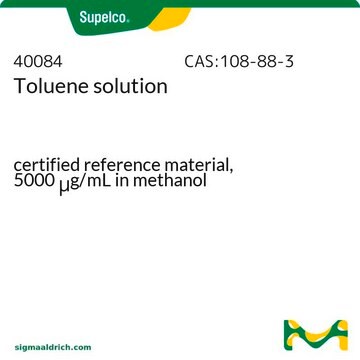About This Item
Recommended Products
grade
analytical standard
Quality Level
vapor density
3.2 (vs air)
vapor pressure
22 mmHg ( 20 °C)
26 mmHg ( 25 °C)
Assay
≥99.9% (GC)
autoignition temp.
997 °F
shelf life
limited shelf life, expiry date on the label
expl. lim.
7 %
technique(s)
HPLC: suitable
gas chromatography (GC): suitable
refractive index
n/D 1.496 (lit.)
bp
110-111 °C (lit.)
mp
-93 °C (lit.)
density
0.865 g/mL at 25 °C (lit.)
application(s)
environmental
format
neat
SMILES string
Cc1ccccc1
InChI
1S/C7H8/c1-7-5-3-2-4-6-7/h2-6H,1H3
InChI key
YXFVVABEGXRONW-UHFFFAOYSA-N
Looking for similar products? Visit Product Comparison Guide
Related Categories
General description
Application
Recommended products
Signal Word
Danger
Hazard Statements
Precautionary Statements
Hazard Classifications
Aquatic Chronic 3 - Asp. Tox. 1 - Flam. Liq. 2 - Repr. 2 - Skin Irrit. 2 - STOT RE 2 Inhalation - STOT SE 3
Target Organs
Central nervous system
Storage Class Code
3 - Flammable liquids
WGK
WGK 3
Flash Point(F)
39.9 °F - closed cup
Flash Point(C)
4.4 °C - closed cup
Personal Protective Equipment
Choose from one of the most recent versions:
Already Own This Product?
Find documentation for the products that you have recently purchased in the Document Library.
Customers Also Viewed
Articles
Learn about analyzing organic volatile impurities (OVIs) in pharmaceuticals using SH-GC, focusing on suitable solvents and ensuring compliance.
Learn about analyzing organic volatile impurities (OVIs) in pharmaceuticals using SH-GC, focusing on suitable solvents and ensuring compliance.
Learn about analyzing organic volatile impurities (OVIs) in pharmaceuticals using SH-GC, focusing on suitable solvents and ensuring compliance.
Learn about analyzing organic volatile impurities (OVIs) in pharmaceuticals using SH-GC, focusing on suitable solvents and ensuring compliance.
Our team of scientists has experience in all areas of research including Life Science, Material Science, Chemical Synthesis, Chromatography, Analytical and many others.
Contact Technical Service















